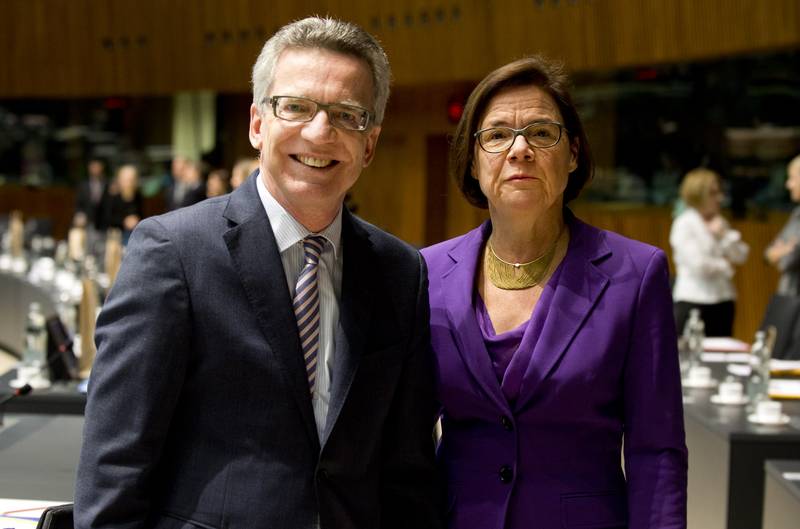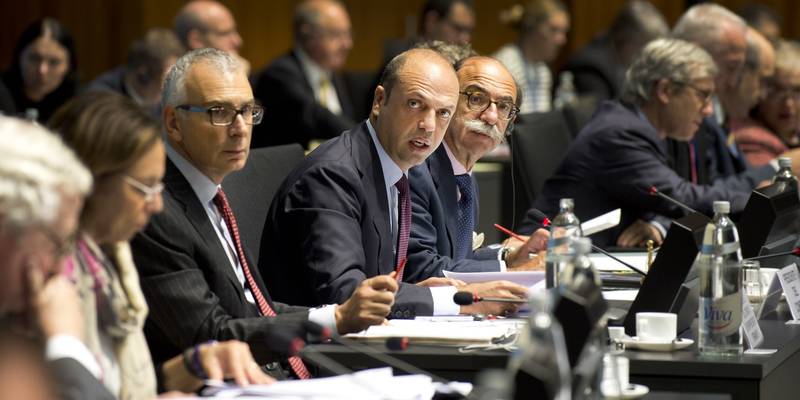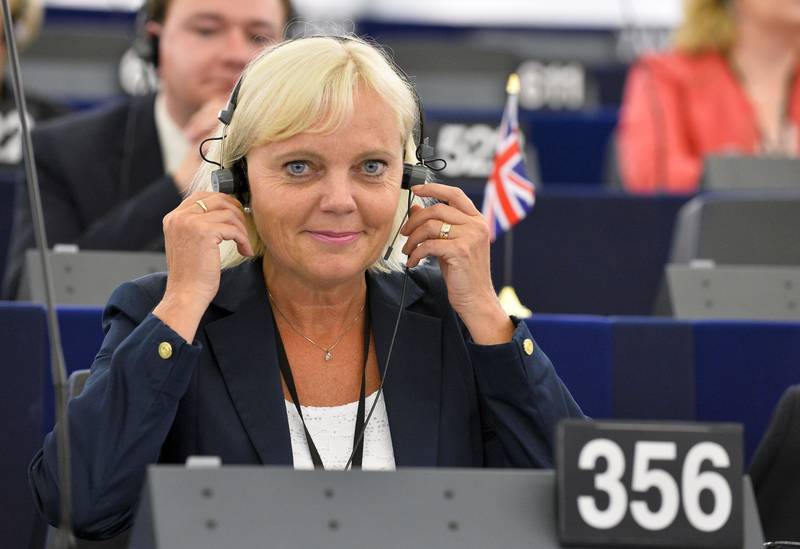Can We Trust the Member States for the European Prosecutor's Office?
Adelina Marini, November 25, 2014
 The more the discussions in the various EU formats deepen on the European Commission's proposal for a single European Prosecution's Office, the more the disagreements and uncertainties. The Italian presidency aims to accelerate the negotiations in the Council but it seems that they will continue slowly and in the direction of a radical change of the initial proposal. In the very beginning, the discussions in the Council showed that this will be one of the toughest dossiers in the EU. In the European Parliament as well, there is uncertainty and disagreement regarding various components of the proposal. This is one of those proposals which make a huge step forward toward bringing national competences up to a central European level which causes great resistance.
The more the discussions in the various EU formats deepen on the European Commission's proposal for a single European Prosecution's Office, the more the disagreements and uncertainties. The Italian presidency aims to accelerate the negotiations in the Council but it seems that they will continue slowly and in the direction of a radical change of the initial proposal. In the very beginning, the discussions in the Council showed that this will be one of the toughest dossiers in the EU. In the European Parliament as well, there is uncertainty and disagreement regarding various components of the proposal. This is one of those proposals which make a huge step forward toward bringing national competences up to a central European level which causes great resistance.
According to the initial proposal, which the Commission presented in the summer of 2013, the new European body should deal only with prosecuting fraud with EU funds. It envisages the national courts to have no more competences on the essence of a case. The prosecution's office will have the right to demand or order prosecution measures thus turning into a "prosecutor" before the relevant courts in the member states. The envisaged structure will consist of a 10-member college of delegated prosecutors: a European chief prosecutor, four deputies and five delegated prosecutors who will work in the member states to investigate and open cases for infringement of the EU's financial interests.
The Council, however, has chosen a different path - to go toward "nationalisation" of the new institution. In March, the justice ministers agreed the college to consist of prosecutors from each member state, which means 28 people. The ministers also demanded the national authorities to keep their main competences by leaving the European prosecutor's office a priority competence to investigate and pursue violations. For the European Parliament's rapporteur on this dossier, Monica Macovei (Romania, EPP), and for the European Commission this is of great concern because it might lead to the body losing its independence. It is essential the procedure of appointment of the prosecutors to be open and European, they urged. From the discussions held so far, it becomes clear that this is not the only problem and that the discontent is mounting to move ahead toward creating a new institution. On 10 October, in Luxembourg, there was a public debate in the Council which, however, ended without agreement on any of the open issues. There were even positions that it is still early to go for a real supra national European prosecution office.
Among the open issues, apart from the body's independence, are also the status of a single legal area. A majority of the ministers requested a more precise definition of the legal area. According to the Italian presidency, a single legal area means that the prosecution's office will not have to recourse to tools that facilitate legal assistance or mutual recognition of court rulings. It will work as a single office as the entire cooperation and interaction between the central office and the delegated prosecutors will be organised on the basis of that principle.
Slovenia believes, however, that a more precise definition is needed because in some member states there are different titles. For instance, some have investigating magistrates while in other countries there is no such category. Croatia is of the opinion that the lack of more precise definition could create more trouble because of the possibility for various interpretations. Another unresolved issue is whether the prosecution should be a single office and also how strong or efficient it should be. The countries that are in favour of a stronger supra national body are definitely not a majority. According to Austria, the European Prosecution's Office should be a supra national body which should be able to implement European arrest warrants and to act completely independently. Bulgaria, too, defends a stronger office from the very beginning of the discussions in the Council. The country was presented on 10 October by the minister of justice in the caretaker government Hristo Ivanov who rejected the concerns of his colleagues about the single legal area saying that there already is a single criminal area which can serve as a basis.
Hungary and Greece, however, are of the opinion that the Union is still not mature enough for such a structure. A majority of ministers said that there should be a single European office but it should work according to the national rules which Germany believes is absurd. The former Justice Commissioner Martine Reicherts (Luxembourg) insisted in a speech in Italy on October 27 that the Council had chosen a path to deviate from the Commission's proposal and go for a college consisting of a prosecutor from each member state. She underscored, that the future prosecution should not be only a place for coordination but also a place where real decisions are taken. The body's independence should be  ensured through a procedure of selection and appointment outside the member states. This procedure should be open, competitive and European, she said.
ensured through a procedure of selection and appointment outside the member states. This procedure should be open, competitive and European, she said.
Ms Reicherts also warned that if it is allowed the body's competences to overlap with those of the national authorities this would be for the sake of its efficiency. What is for the EPPO is for the EPPO, she underscored. Monica Macovei, too, defends the thesis that the European Prosecution's Office should be a strong, independent and supra national body. A weak solution will make it impossible to respond to the expectations of the taxpayers. She said she doubted the body will be efficient in its current form. The shadow rapporteur in the European Parliament, Sylvia-Yvonne Kaufmann (S&D, Germany) brought up several issues during a debate on the dossier in the committee of civil liberties, justice and home affairs on 20 November. She said that this is one of the most complicated dossiers, but the Council does not work transparently enough and does not provide in time the documents from all the discussions. According to her, a structure based on a college and a chamber will not ensure the needed independence.
The MEPs from the eurosceptic groups who spoke - Europe of Freedom and Direct Democracy (EFDD) and the European Conservatives and Reformists (ECR) - were of the opinion that it is better, instead of a new institution, to improve the work of the existing instruments for mutual legal assistance. Some were extreme in their statements.
The non-governmental organisation for fight against corruption at global level, Transparency International, has urged the Italian Presidency to put pressure on the member states the European Prosecutor's Office to be independent from the member states. In order to enhance the efficiency of the investigation and prosecution of fraud with EU funds the mandate of the office should be robust and to include serious trans-border corruption cases. However, this is precisely what seems hard to achieve, especially taking into account the rise of the influence of the eurosceptic political parties across Europe. Although they still do not have sufficient influence in the European Parliament, the statements of their MEPs draw a very clear picture of the situation at national level.
During the debate in the civil liberties committee on 20 November, Kristina Winberg, MEP from the Swedish far right party Swedish Democrats, said that "the contours of a European super state are becoming clearer and clearer. The Swedish authorities are completely capable of dealing even with cross border crime. The European Commission can keep its inquisitors in Brussels". The Swedish Democrats took a significant political territory at the last parliamentary elections this autumn in Sweden. Vicky Maeijer, a non-attached MEP from Geert Wilders's nationalistic party in the Netherlands, spoke in t he same spirits saying that the member states are completely capable of investigating and pursuing financial crimes even when it comes to European fraud.
he same spirits saying that the member states are completely capable of investigating and pursuing financial crimes even when it comes to European fraud.
According to the European Commission, however, this is not quite so. Currently, the existing EU bodies - the European anti-fraud agency OLAF, the European agency for cooperation in the area of criminal justice Eurojust and the European police service Europol - do not have competences to conduct criminal investigations or to pursue cases of fraud. OLAF can only send the results of its administrative investigations to the competent national authorities, which decide independently whether to open a criminal case on the basis of OLAF's findings.
The average success of penal proceedings of such types of crimes in the EU is 42.3%. According to data of the Commission, in the period 2006-2011 the cases that ended with court rulings had the lowest number in Greece (19.2% or five sentences of totally 86 cases, of which 26 ended with a ruling); Romania (23.4% or 30 sentences out of 225 cases, of which 128 ended with a court ruling) and UK (23.1% or 3 sentences out of 19 cases, 13 of which ended with a court ruling). The ambition of the new office is to be able to handle 2500 cases per year. The Presidency has planned a new debate on the issue during the December Justice and Home Affairs Council.
Another open issue, which emerged during the discussion of the European Commission's proposal is whether the competence of the new prosecutor's office will duplicate the competences of OLAF or Eurojust. The Presidency admitted during the debate on 20 November in the civil liberties committee that, at this stage, there is no complete answer to the question how can the conflict of competences be avoided since this issue has not yet been discussed, said Lorenzo Salazar on behalf of the Presidency. What is essential, though, is whether the trend to go toward an intergovernmental structure will continue because this brings up the question whether we can trust the member states, especially bearing in mind that some of them have not yet completed the promised reforms of the judiciary and do not make any progress in their fight against corruption, like Bulgaria for instance in the framework of the Cooperation and Verification Mechanism.
Some countries may be doing very well even when it comes to trans-border crimes, but everything depends on the national authorities and some of them not only do not do well but even do not have the will to. The question is not unimportant because, according to Monica Macovei, in 2013 the reported fraud in the EU is worth 300 million euros. Corruption was more than 20 billion euros.
 Federica Mogherini | © Council of the EU
Federica Mogherini | © Council of the EU | © Council of the EU
| © Council of the EU Luis De Guindos | © Council of the EU
Luis De Guindos | © Council of the EU